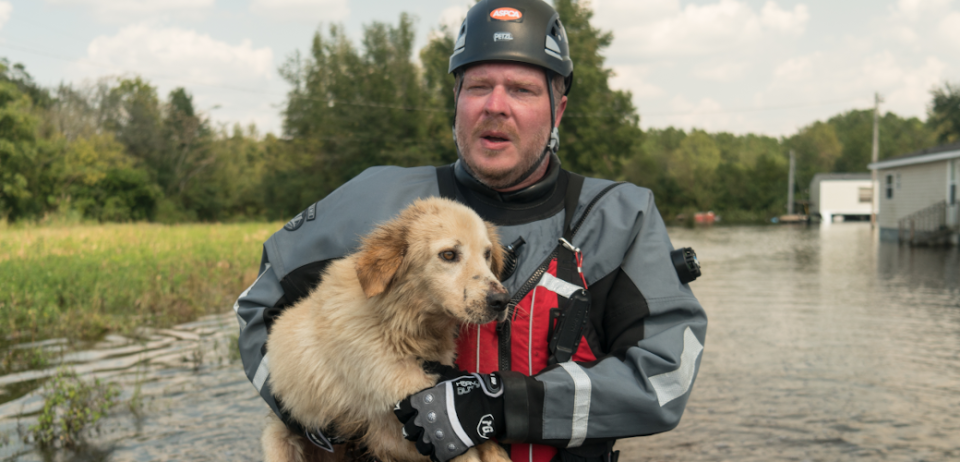Is your pet prepared for a disaster? These tips from the Potter League will help.
Hi folks, your friend Tuki here on my perch at the Potter League. I know it has been a pretty dry summer, but we are in the middle of hurricane season – even though we don’t get too many here, thankfully and I thought you might like some tips on how to prepare in case you ever need to evacuate with your pets. Remember, if it’s not safe for you to stay home, it’s not safe for your pets either so it’s best to have everything ready in one spot so you can just grab your supplies and go! You’ll need to prepare supplies for the humans in your family too, but that’s beyond this bird’s knowledge! Websites with information about how to plan for your human family include redcross.org, and ready.gov. Now, back to planning for your pets!
Find a Pet-Friendly Shelter
Find out where the emergency shelters are in your area and whether they accept pets. Many more emergency shelters are accepting pets (with their owners, of course!) but you should also identify some local hotels that take pets or friends/relatives with whom you and your pets can stay temporarily. You can contact local shelters and boarding facilities to see whether they can provide emergency shelter if needed, but make sure that all these options are far enough away that they will not need to evacuate too. You may also want to think about a identifying a permanent caregiver for your pets in case something should happen to you.

Remember Pet Safety
If your pet is not microchipped, consider getting that done. This is the easiest way for you pet to find their way back to you if you get separated. Be sure that your pet has a collar and tags with up-to-date information such as their name, your telephone number, and any urgent medical needs that your pet may have. Be sure you have a carrier that can hold your pet comfortably and write the same information that is on the tags on your pet’s carrier.
What to Bring
Just like for your human family members, you’ll need an emergency kit for your pets so that they have everything they need away from home. You should plan to bring enough supplies for approximately two weeks. It’s a good idea to have this kit packed and ready all the time, but you’ll have to check it frequently and replace things that are expired.
· Crate or carrier for each pet
· Pet first aid kit – ask your veterinarian what is best to include
· Food – canned or dry food is recommended since you may not have access to refrigeration. If you bring canned food, make check to be sure the cans have a pop top or include a manual can opener in your kit
· Bottled water – you’ll probably want to include this in your human emergency kit too, so make sure you have enough for all your family members, furry and otherwise!
· Copies of your pets’ medical records including any medications they take

· Recent photographs of your pet(s) in case you get separated. These can be copied and given out to shelters as well as used to make posters to help locate your pet.
· If your pet takes medications, be sure to have at least a 7-day supply
· Food and water bowls. Collapsible bowls are perfect for including the kit since they don’t take up as much room as plastic or metal bowls.
· For cats, disposable litter trays and scoopable litter
· For dogs, include cage liners if your dog is not trained
· Blankets or towels to give your pet something comfortable to sleep on. Typically, pet beds are too large and bulky to carry so you probably want to leave them behind.
· Cleaning supplies such as paper towels, liquid soap, disinfectant, and disposable garbage bags. You may also want to include some dry pet shampoo or cleaning wipes for your pet in case they need some cleaning up.
· Favorite toys. Being evacuated will be stressful for your pet as well as you so having a favorite toy along can provide some comfort. You may not be able to keep to your usual walking routine, so a toy they enjoy playing with can help them get some exercise.
Returning home
Returning home after a disaster can be as stressful for your pet as it is for you. Be careful of any debris or substances that can cause then harm if stepped on or ingested. Watch their behavior. Some pets may become anxious or defensive, especially if the disaster has affected any scents that they associate with home. Just like you, it will take some time for your pet to re-adjust and be comfortable at home again.
Well folks, I hope this helps, but I also hope you never need to use these tips!
‘Till next time, your friend
Tuki
Mail questions to Tuki, P.O. Box 412, Newport, RI 02840, or send email to TukiTalk@PotterLeague.org. The Potter League for Animals can be found at 87 Oliphant Lane in Middletown and online at potterleague.org.
This article originally appeared on Newport Daily News: Tips for disaster preparedness for pets from the Potter League

